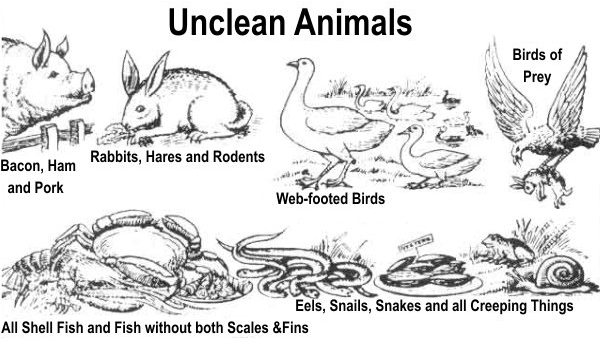By Tyson Thorne

Yesterday we asked if modern Jesus-followers need to obey any of the Old Testament Law. Many believer’s suggest that, since Jesus fulfilled the law we are no longer beholden to any of it. This wasn’t the teaching of Paul and the early church fathers, however, who wrote a strange letter to be circulated among Gentile believers outlining what laws they should pay attention to. Of all the laws of Moses they listed these few: “abstain from meat that has been sacrificed to idols and from blood and from what has been strangled and from sexual immorality.”
Of these rules, sexual immorality makes the most sense. Jesus addressed this issue during his earthly ministry (Matthew 5.28) as did Paul (1 Corinthians 6.18, for one of many passages). The others relate to Jewish dietary restrictions, something the modern church doesn’t pay any attention to. Should we? It’s a question I posed to Igal German, a Messianic Jew who teaches at the Israel Institute for Biblical Studies. “While Peter’s vision of the blanket descending from heaven and God’s voice booming from the clouds “kill and eat” was primarily a lesson about the gospel being appropriate for Gentiles, doesn’t it also teach that unclean animals are no longer unclean?” I asked.
“Not at all,” he explained. “That vision was only an illustration about taking the Gospel to the Gentiles.” Igal then took me through the Bible, noting that dietary laws were given all the way back in Genesis 9 to Noah, long before the Mosaic law was given. The dietary laws were affirmed in the time of Moses, then again in Acts 15, and finally in the book of Revelation. John notes in Revelation 18 that future “Babylon” has become a haven for all unclean things, and even mentions unclean birds and beasts. Therefore, from day one of the post-flood world all the way to the nearing of the destruction of this present time clean and unclean animals are properly identified, indicating that these laws are universal and not strictly for Jews. That places dietary restrictions squarely in the camp of moral law. It is an interesting and well thought out argument.
His argument is not only well made, it is one I’m having difficulty arguing against. When I took the Nazarene Vow a couple years ago I subjected myself to Jewish dietary laws (as best as I could) and found it entailed making some difficult changes. My eating habits are, in Biblical terms, very unclean. One benefit of this hardship, however, is the intentional way one must live life in order to please God, and that is a very big benefit indeed.
What does this mean for believers going forward? Should we all start obeying the dietary restrictions found in the Old Testament? I think it is important to do more research, but it is something to consider. For now I’ll leave this as a matter of conscience and address my findings in a future post. I’d like to note that this is not an attempt to bring back all Old Testament law, or to promote “legalism” in the church. I’ve spent much of my life combatting such notions. That said, if there is a moral component to dietary restrictions that is something worth pursuing and obeying.
One last thought, When Israel was conquered by the Babylonians the prophet Daniel was among those captured and taken into special training by the royal court of Nebuchadnezzar. One of the things that Daniel and his friends held to, even in the midst of a pagan empire, were the dietary laws (Daniel 1.8). This was a risky proposition, and no one would have blamed these men for going with the flow. They were no longer in Israel, and it appeared as if they were already under God’s judgment. What harm would be done if they partook of the pagan King’s table? Yet God approved of their willingness to obey and blessed them (Daniel 1.15-.17)
|
|
